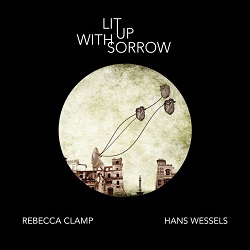
 Rebecca Clamp – here collaborating with her partner Hans Wessels – writes songs that are like three minute windows into her life, with subject matters relating to her feelings in a particular instant, summaries of conversations at cross-purposes, pencil sketches of friendships and relationships. Her unrhyming verse is accompanied by knowingly quirky arrangements leaning predominantly on piano and ukulele and expanded with splashes of electronica. At their best, as on Liminal, the combination feels insightful, the mood reflective and the little details like “I’ll be there at the shore with a pot of strong tea, when you return” take on additional layers of significance of home and an understood devotion. Elsewhere, as on All the Best, it’s the little details which can cause a disconnect as when Rebecca Clamp declares, slightly pretentiously, that “a heart can’t be played like a game of Carcassonne”. Sure, this makes sense – who’d want a romance that reflected Carcassonne’s gameplay which relies on gathering the most to oneself and avoiding at all costs sharing with others? Obviously romance should be like Pandemic – fully collaborative and if played well everyone avoids a highly infectious disease. Which leaves one wondering – are board games really good metaphors for romantic entanglements?
Rebecca Clamp – here collaborating with her partner Hans Wessels – writes songs that are like three minute windows into her life, with subject matters relating to her feelings in a particular instant, summaries of conversations at cross-purposes, pencil sketches of friendships and relationships. Her unrhyming verse is accompanied by knowingly quirky arrangements leaning predominantly on piano and ukulele and expanded with splashes of electronica. At their best, as on Liminal, the combination feels insightful, the mood reflective and the little details like “I’ll be there at the shore with a pot of strong tea, when you return” take on additional layers of significance of home and an understood devotion. Elsewhere, as on All the Best, it’s the little details which can cause a disconnect as when Rebecca Clamp declares, slightly pretentiously, that “a heart can’t be played like a game of Carcassonne”. Sure, this makes sense – who’d want a romance that reflected Carcassonne’s gameplay which relies on gathering the most to oneself and avoiding at all costs sharing with others? Obviously romance should be like Pandemic – fully collaborative and if played well everyone avoids a highly infectious disease. Which leaves one wondering – are board games really good metaphors for romantic entanglements?
There’s similar deliberate construction to the song arrangements – One String Bass thankfully eventually opens out the introductory bass line played on a piano to a slightly wider tune that still relies on a percussive repetition. It’s the story of a complicated relationship with someone who “took me places I’d never been / but I didn’t like half of them”. When Clamp then dreams of being given the gift of a 12-string guitar in the shape of a baby this is rejected as it’s too many strings, too many complications – she’d prefer to stick with the One String Bass of a friendship that she can understand and work with. Conversely – and this is an album of hits and misses – Tattoo, Tattoo fits perfectly with it’s disorientating and precisely repetitive accompaniment.
If the definition of the purpose of a singer-songwriter is to reveal – directly or obliquely – the details of their lives to then, in some subtle way, illuminate the thought processes of the listener then Rebecca Clamp more than fulfils this remit. It needs the right listener though as Lit up with Sorrow is an album that’s as likely to irritate as to enchant.
Summary
Third album of folktronica is revealed as a mixed hand of pleasures.


